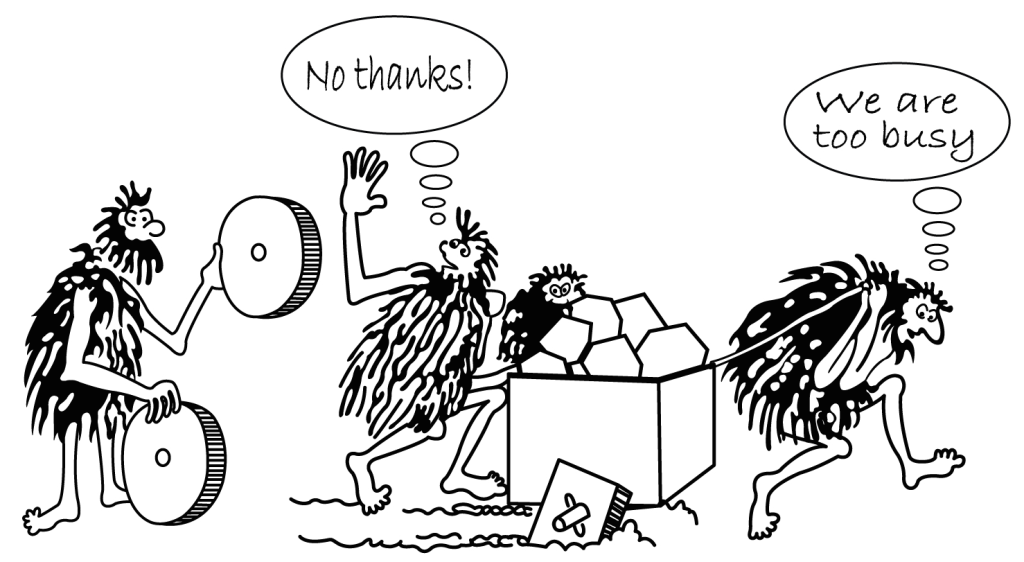Continuous Improvement
Kaizen is a Japanese word that roughly translates to “continuous improvement” (the Japanese characters translate directly to “change” and “good”). It is a mindset that nothing is perfect and everything must (and needs to be) improved. When driven by senior leadership, kaizen can create a powerful organizational culture that focuses on developing competitive advantages and differentiation.
A kaizen mindset focuses on teamwork, personal discipline, and embracing failure. In addition, everyone within the organization is encouraged to continually provide suggestions to improve every aspect of the business. Kaizen focuses on standardizing repeatable processes, measuring effectiveness, comparing measurements over time, ongoing creativity and innovation, and working within a cycle of continuous improvement.
Organizations focused on kaizen often use improvement process cycles such as plan, do, check, and act (PDCA). A never-ending process to think-create-innovate and improve. Toyota demonstrated how kaizen can create a highly successful organization while Masaaki Imai brought kaizen to the world’s attention with his famous book Kaizen: The Key to Japan’s Competitive Success.
Comedians Working Hard
As a business professional, you can develop a kaizen philosophy learning from stand-up comedians. Don’t laugh, successful comedians live and breathe based on a mindset (and practice) of continuous improvement. Never being satisfied with their current work, they continually refine and change their jokes and stories. They embrace failure based on “bombing” and then going back and rewriting their jokes.
Comedians also never stay complacent. Successful comedians get stage time as often as possible (typically several times per night, several nights per week). In addition, they will travel hundreds of miles for $25 to get stage time. It’s about practice, failure, and perseverance. It’s about never giving up and continually pushing forward to grow, learn, and eventually succeed. It’s a constant focus on improvement. It’s about moving beyond what was successful to create new material and redefine your skills.
Nightly practice in front of live crowds, creating podcasts, doing talk radio, writing every day, working corporate events, performing at colleges, etc., are all ways comedians develop skills and continually improve. Just like comedians, business professionals need to embrace business not as a 9-5 job, but as an opportunity to continually learn. In addition, business professionals need to enjoy creating, developing, and providing great products that customers embrace.
Always look for better ways to do things. Stay positive and avoid complacency and doing the same thing day-after-day. Develop new ways to ideate, educate sales people on new products, or engage with new audiences. An ongoing, deliberate focus to continuously improve will change your personal and professional lives (for good) and make for a more enjoyable and exciting career.
It’s About the Customer
Comedians, just like successful businesses, focus on the customer (audience) to “feel” how jokes are received (and what people think is funny). Comedians also focus on identifying root causes. Why did the joke “bomb”? After a bomb (i.e., failure), comedians will go back and listen to audio recording of their set and determine why the joke was not successful. They will continually refine the joke until they have removed all the clutter and have a joke that connects with the audience. Just as you need to continually understand what customers like and dislike about your product, comedians continually refine their product (i.e., jokes, stories, etc.)
Nothing is ever perfect. Everything can be improved. A kaizen mindset can transform how you do your work and how your company performs. A focus on daily improvement, embracing failure and learning from it, creating high quality products, and meeting customer needs is the foundation of a kaizen culture.
Become the student of your chosen profession. Don’t stop learning when you finish college. The majority of powerful business tools are not taught in school. You need to find these through an ongoing search for knowledge and improvement.
Dean Delray
Become a comedian. Be like Dean Delray who decided to become a professional comedian at age 44 (after 25 years in the music industry). He rode his motorcycle to get stage time anywhere and in any weather. He got on stage hundreds of times per year. He developed a podcast and worked at his craft. He is now touring with Bill Burr (probably one of the all-time greatest comedians) and is starting to become very successful. It only took 7 years, getting stage time 7 days per week, never complaining, and working every day to improve his writing and skills. (https://www.deandelray.com/)
Jerry Seinfeld
How about Jerry Seinfeld – maybe the master of kaizen. He writes every day. No breaks, no excuses. In addition, he still does stand up, has a hugely successful web series (Comedians in Cars Getting Coffee), and produces shows, writes books, etc. No matter how successful he was with his TV show (Seinfeld) he still works every day to get better at comedy. The cycle of improvement never ends. (http://comediansincarsgettingcoffee.com/)
Joe Rogan
Another comedian with the kaizen mindset is Joe Rogan. From acting and being one of the top stand-up comedians, to being one of the pioneers of podcasting, to working as the color commentator for the UFC, he never stops. Every night he can be found at local SoCal comedy clubs practicing new material. And he doesn’t get comfortable with successful material, either. Every year he keeps creating new material to engage his audiences and stay relevant. Hard work, dedication, and a positive attitude equals success. (http://podcasts.joerogan.net/)
Conclusion
No matter your job, adopting a kaizen mindset can result in a better, happier life, and great personal and professional success. Business professionals need to learn from comedians. Develop the habits to continually refine and improve your skills, practice every day, and embrace failure. Lifelong learning and improvement is as critical for successful business as successful comedy.








